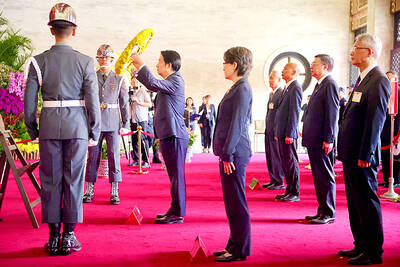Decisions to build a network of Japanese highways have become so entangled in political deal-making they seem to ignore the public interest, analysts say.
Around two-thirds of the population are against constructing new highways, many of which are built in the countryside where usage is low, according to a recent newspaper survey.
However, 240 lawmakers from Japan's three ruling parties formed a group in July to promote building more roads.
"Road construction projects are decided essentially under the table among lawmakers, steelmakers and construction companies," said UBS Warburg's political analyst Shigenori Okazaki.
"A real problem is that in Japan, people have never had serious discussions about this. There has never been any attempt by lawmakers or taxpayers to make bureaucrats explain the reality of road projects," he said.
Four public corporations which build and manage expressways are collectively buried under ?40 trillion (US$341.9 billion) in debt, while 27 of Japan's 40 toll highways continue to accumulate massive losses and remain chronically under-used.
These grim figures were only made public by Japan Highway Public Corp last month after pressure from a new advisory panel to Prime Minister Junichiro Koizumi.
Undaunted, the government still plans to build 2,300km of highways, which will require ?20.6 trillion in additional investment.
"An assumption is that the roads will pay for themselves by collecting tolls. But most of them will be in areas where traffic volume is light," said Akihiko Suzuki, urban development analyst at UFJ Research Institute.
Analysts say bureaucrats use limited data to justify projects that have already got the green light from politicians and contractors.
Support from such people with vested interests keeps highway officials protected despite public disapproval of their huge spending and inefficient management, analysts said. One notorious example is the US$11-billion Tokyo Bay Aqua Line, the world's longest undersea road tunnel attached to a bridge that runs above water. The expressway, which opened in 1997, is only used by about 13,000 motorists a day, fewer than a third of an initial government estimate made to justify the project.
"The actual demand did not reach our expectations because of the prolonged recession," a spokesman from Japan Highway said.

RESPONSE: The transit sends a message that China’s alignment with other countries would not deter the West from defending freedom of navigation, an academic said Canadian frigate the Ville de Quebec and Australian guided-missile destroyer the Brisbane transited the Taiwan Strait yesterday morning, the first time the two nations have conducted a joint freedom of navigation operation. The Canadian and Australian militaries did not immediately respond to requests for comment. The Ministry of National Defense declined to confirm the passage, saying only that Taiwan’s armed forces had deployed surveillance and reconnaissance assets, along with warships and combat aircraft, to safeguard security across the Strait. The two vessels were observed transiting northward along the eastern side of the Taiwan Strait’s median line, with Japan being their most likely destination,

‘NOT ALONE’: A Taiwan Strait war would disrupt global trade routes, and could spark a worldwide crisis, so a powerful US presence is needed as a deterrence, a US senator said US Senator Deb Fischer on Thursday urged her colleagues in the US Congress to deepen Washington’s cooperation with Taiwan and other Indo-Pacific partners to contain the global security threat from China. Fischer and other lawmakers recently returned from an official trip to the Indo-Pacific region, where they toured US military bases in Hawaii and Guam, and visited leaders, including President William Lai (賴清德). The trip underscored the reality that the world is undergoing turmoil, and maintaining a free and open Indo-Pacific region is crucial to the security interests of the US and its partners, she said. Her visit to Taiwan demonstrated ways the

GLOBAL ISSUE: If China annexes Taiwan, ‘it will not stop its expansion there, as it only becomes stronger and has more force to expand further,’ the president said China’s military and diplomatic expansion is not a sole issue for Taiwan, but one that risks world peace, President William Lai (賴清德) said yesterday, adding that Taiwan would stand with the alliance of democratic countries to preserve peace through deterrence. Lai made the remark in an exclusive interview with the Chinese-language Liberty Times (sister paper of the Taipei Times). “China is strategically pushing forward to change the international order,” Lai said, adding that China established the Asia Infrastructure Investment Bank, launched the Belt and Road Initiative, and pushed for yuan internationalization, because it wants to replace the democratic rules-based international

WAR’S END ANNIVERSARY: ‘Taiwan does not believe in commemorating peace by holding guns,’ the president said on social media after attending a morning ceremony Countries should uphold peace, and promote freedom and democracy, President William Lai (賴清德) said yesterday as Taiwan marked 80 years since the end of World War II and the Second Sino-Japanese War. Lai, Vice President Hsiao Bi-khim (蕭美琴) and other top officials in the morning attended a ceremony at the National Revolutionary Martyrs’ Shrine in Taipei’s Zhongshan District (中山) to honor those who sacrificed their lives in major battles. “Taiwanese are peace-loving. Taiwan does not believe in commemorating peace by holding guns,” Lai wrote on Facebook afterward, apparently to highlight the contrast with the military parade in Beijing marking the same anniversary. “We